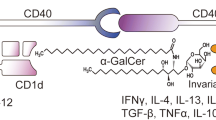Abstract
Immune system-based approaches for the treatment of malignant disease over the past decades have often focused on cytolytic effector cells such as cytotoxic T lymphocytes (CTL), and natural killer (NK) cells. It has also been demonstrated that tumor-bearing mice can be cured using a wide variety of approaches, some of which involve cytokine-mediated enhancement of CTL and NK cell activity. However, the apparent success in mice stands in contrast to the current situation in the clinic, wherein only a minority of patients have thus far benefited from CTL- or NK cell-based antitumor approaches. The underlying causes of tumor-associated immune suppression of CTL and NK cell activity are discussed, and features of interest shared with HIV infection, leprosy, and rheumatoid arthritis are also be mentioned. Remarkable and very recent observations have shed more light upon the causes of dysfunctional alterations in CTL and NK cells often associated with these diseases, that in turn have suggested new immunotherapeutic approaches for cancer and infectious disease.
Similar content being viewed by others
Author information
Authors and Affiliations
Additional information
Received: 20 March 1999 / Accepted: 3 May 1999
Rights and permissions
About this article
Cite this article
Kiessling, R., Wasserman, K., Horiguchi, S. et al. Tumor-induced immune dysfunction. Cancer Immunol Immunother 48, 353–362 (1999). https://doi.org/10.1007/s002620050586
Issue Date:
DOI: https://doi.org/10.1007/s002620050586




